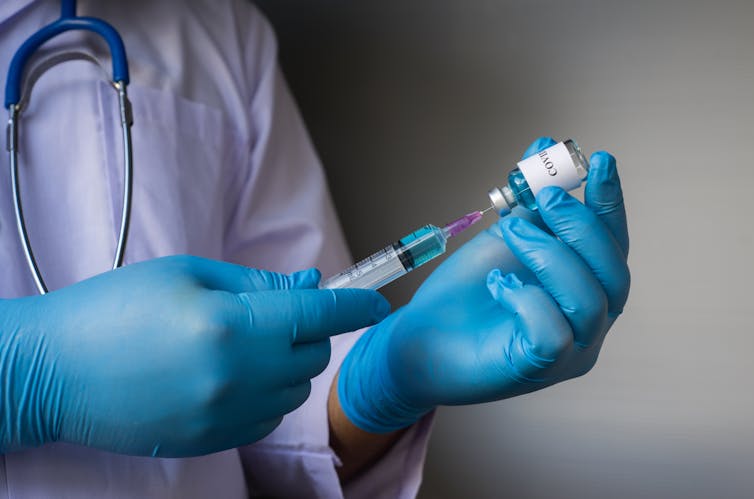
Dominic Wilkinson, University of Oxford
Two months ago I received an email from a colleague inviting me to join a global campaign to support a form of vaccine research that would involve deliberately infecting volunteers with COVID-19. This might seem like a strange idea. Some people have raised concerns about this research. Some even think that it would violate the Hippocratic oath for a doctor to expose research participants to harm in this way.
But as a medical doctor, an ethicist and a researcher, I strongly support COVID-19 challenge trials. I replied immediately and have joined over 150 academics on an open letter advocating preparation for these trials. This week, there are reports that the first of these trials will start in London in 2021. Special research facilities are being developed, and several thousand young people in the UK have already volunteered to be part of such a trial.
An ethical imperative
The basic argument in favour of challenge trials is extraordinarily simple. The pandemic has caused massive harm, both directly and indirectly. To date, it has resulted in more than 30 million documented infections and almost a million deaths. It has led to the worst economic downturn since the Great Depression.
Developing an effective vaccine is our greatest hope of escaping the pandemic and returning to something like normal life. Also, the sooner we develop a vaccine, the better. If we can identify and make available a vaccine even one month sooner, it would potentially save tens of thousands of lives.
Challenge trials have been used in vaccine development for many years. Standard phase 3 vaccine research studies give the vaccine (or a placebo) to thousands of people and wait for some of them to develop the infection naturally. This can take months or years. In comparison, challenge studies involve a relatively small number of volunteers who are exposed to both the vaccine and the virus. In a short space of time, it can be clear whether or not the vaccine is any good.
Challenge studies are not the only form of research needed, but there is a real hope that they could help. They might be particularly important in working out which of the many vaccines under development is the best.
Balancing risks
The reason COVID-19 challenge studies are controversial is because they involve significant risk. Unlike other illnesses that have been studied in this way, such as malaria, cholera and influenza, there is no definitive treatment for COVID-19. There is a risk that volunteers could get seriously ill or even die as a result of taking part in the trial.
But the planned challenge studies are designed to make that risk as low as possible. They would involve healthy young adults who are at the lowest risk of serious complications of COVID-19. They would be closely monitored in a dedicated research facility with access to the best available treatment if they were to get sick.
Also, we have to balance those risks against the harms if we do not conduct challenge trials. If a vaccine is delayed or we end up using one that is less effective, it will result in serious illness and death to many more people.
Volunteers
Perhaps it is easy for me to support the study. I would not be eligible to take part. The exact criteria are not yet available, but the London study is likely to restrict the study to young healthy adults.
But I have an 18-year-old son who could join. Would I be willing for my own son to take part in a COVID-19 challenge trial?
I would, like any parent, worry. I would probably lose sleep. I would want to read the fine print and talk with him to make sure he understood clearly what it involved and the risks. Informed consent will lie at the heart of any challenge study, and all who take part must enter it with their eyes wide open.
But although I would fret about the risks, they are, in essence, the same risks he faces – that we all face – whenever we leave our home. With a national lockdown looking unlikely, many of us will be exposed to coronavirus this winter.
And, if he were still prepared to volunteer for a challenge study, if he wished to join the more than 37,000 volunteers worldwide who have registered to participate in challenge trials, I would be immensely proud. Those volunteers are doing something very similar to those who volunteer for the armed services in times of war or sign up for humanitarian relief work in difficult and dangerous parts of the world. They recognise the seriousness and urgency of the need and the way in which they could make a material difference. They deserve our admiration, our support and our thanks.![]()
Dominic Wilkinson, Consultant Neonatologist and Professor of Ethics, University of Oxford
This article is republished from The Conversation under a Creative Commons license. Read the original article.

Well, it seems that almost all of the vaccines are aiming at merely attenuating the milder symptoms and the ‘life-saving’ justification is largely inappropriate; presumably this would lessen the strength of support that you would accord to any trial.
Comments are closed.